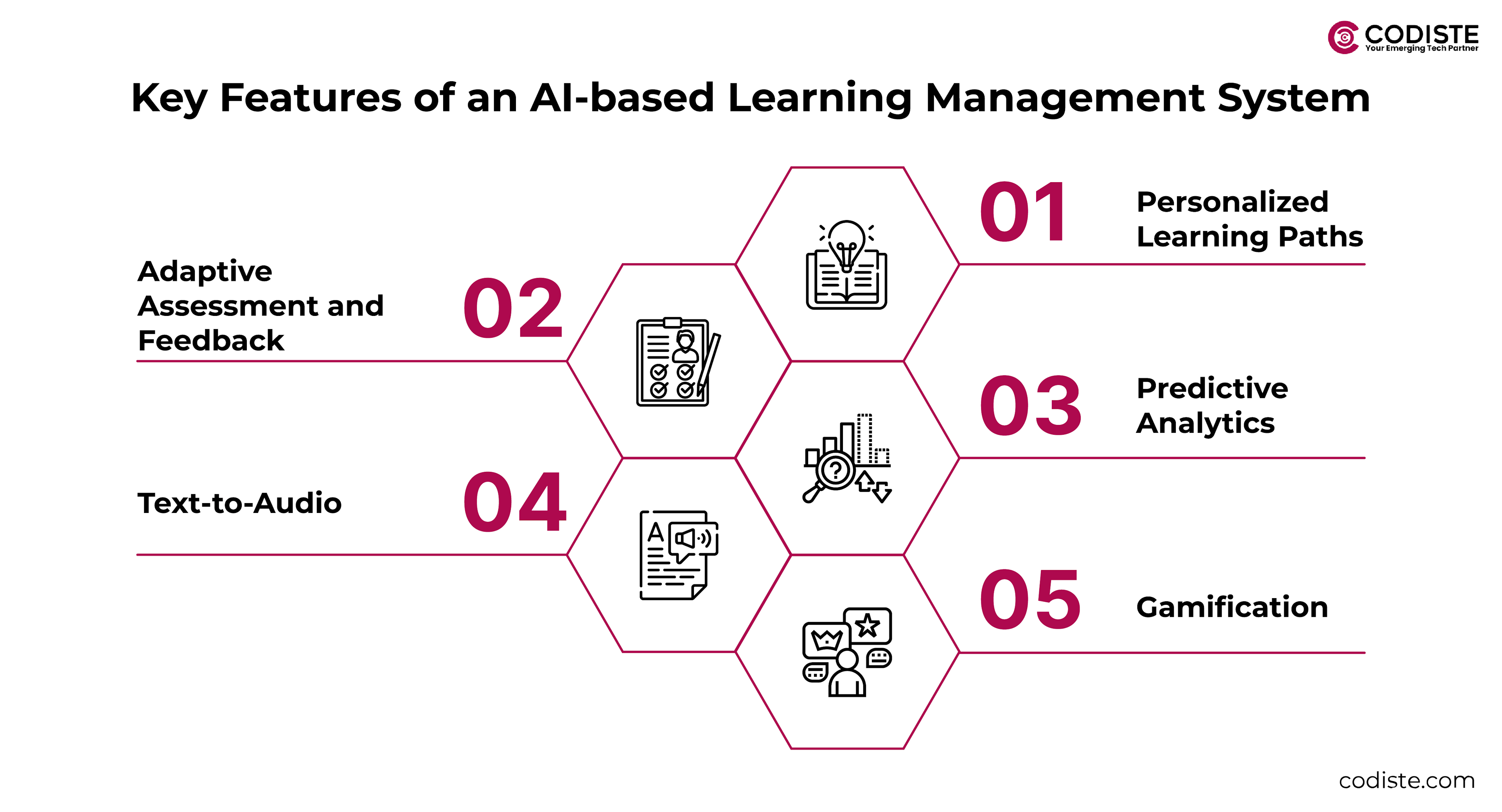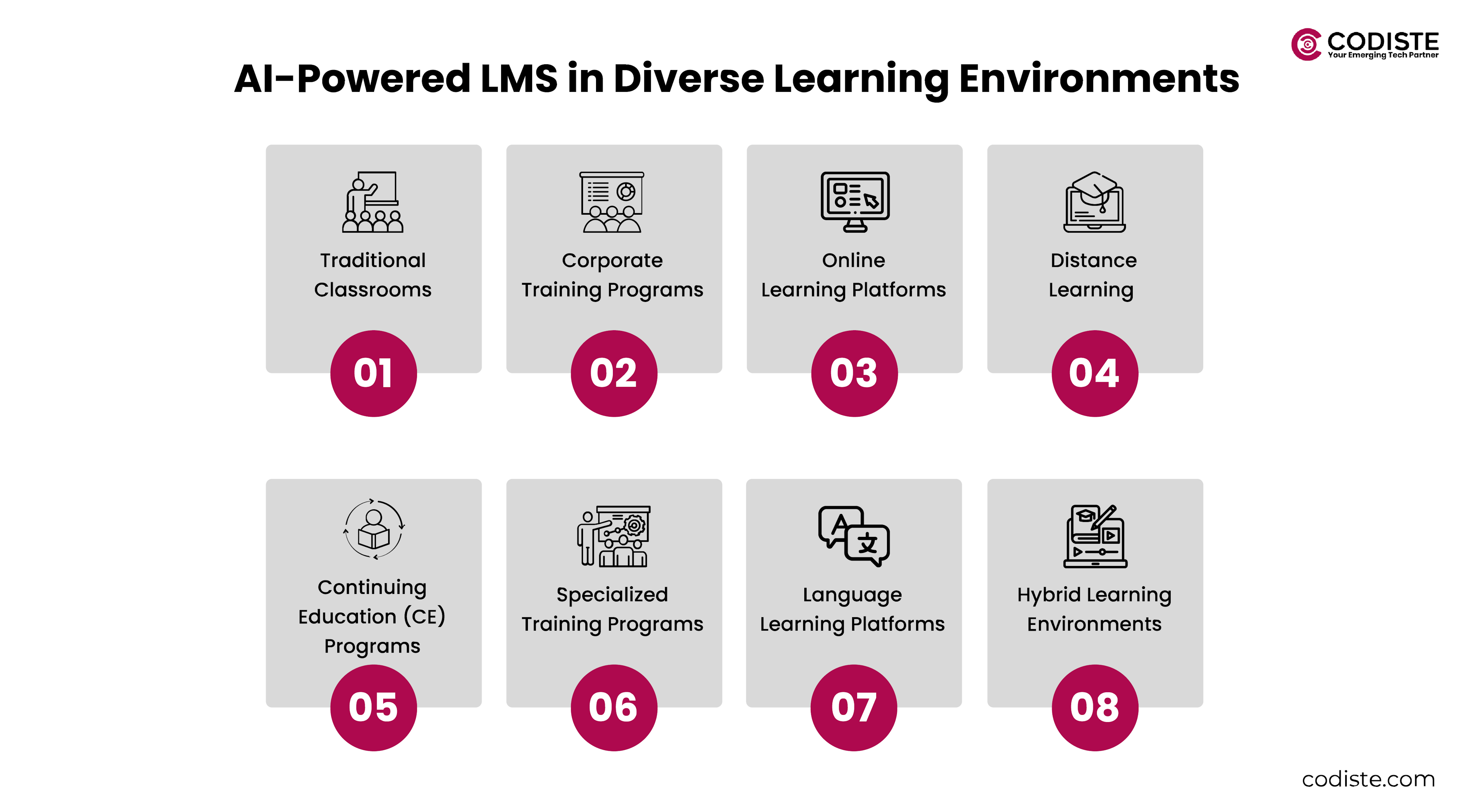
,
Education and professional training are currently undergoing rapid digital transformation with the evolution of AI in EdTech. Learning Management Systems have greatly contributed to the entire digital transformation process. As shown in a new report, the LMS industry is likely to hit a mark of $65 billion in revenue by 2030. A growing need for efficient and advanced technology-driven learning applications drives this. AI-based Learning Management System (LMS) platforms are taking center stage in this industry and are becoming the most widely used learning solutions on the market. This article traces the history of Learning Management Systems (LMS), their current benefits and limitations as well as their effects on different educational sectors.
What Is an AI-based Learning Management System?
A Learning Management System also popularly called LMS is a type of computerized program aimed at delivering, tracking, and managing various types of educational and training programs. This system aims to assist in the whole teaching and learning process by making it easier for everybody who may be involved. It is worth noticing that these Learning Management System applications have rich resources that allow them to address the specific needs of learners. By creating better relationships between teachers and learners. It helps to maintain the highest possible quality of education.
The Journey of AI-based LMS from Traditional LMS
The conversion from conventional Learning Management Systems to AI-powered systems indicates a transforming change in the way education is imparted and managed. The usual LMSs are primarily based only on the delivery of content as well as basic monitoring of users somewhat similar to how a less advanced computer works. However, AI-driven LMSs follow different approaches unlike conventional systems. This is made possible through advanced technologies like AI, predictive analysis and NLP. These applications can improve the learning process through specific and individual ways of learning.
A Brief on AI Technologies Integrated into LMS
AI-driven LMS platforms are dependent on various AI technologies and are successful in enhancing the learning experience:
- Machine Learning
Comprehends the behavior of the learner and the areas of study they are interested in. It makes learning more personal. - Predictive Algorithms
Estimates learner results. It is helpful for the teacher to customize the course. - Natural Language Processing (NLP)
Enables intelligent tutoring, feedback and content creation. - Data Analytics
Offers deep insights into learners’ performance and the course's effectiveness.
How Is an AI-based LMS Different From a Standard LMS?
There are some differences between regular LMSs and LMSs in terms of flexibility and interactivity. Although traditional LMSs have satisfactory performance in content release and simple supervision, AI-based learning systems are advantageous with dynamic and scientifically-driven learning experiences.
Key Differences in Features and Functionalities
- Uniform Learning Path vs. Dynamic Learning Journey
The majority of traditional learning management systems follow a practice known as ‘Uniform Learning Path’, where one set learning path is provided to the learners. However, recent custom eLearning developments in technology have made it possible to provide even the simplest or most basic education with a ‘Dynamic Learning Journey’. This is possible through AI-based LMS where learning is tailored to individual learners' needs, interests, and abilities. - Static Content vs. Personalized Content Delivery
Traditional Learning Management Systems use static content where all students get the same material. However, AI-powered systems deliver personalized content that focuses on how each learner interacts with the program. This way, helpful pointers, and relevant reading materials are sent to specific students. This ensures that the learning process is relevant for each one of them.
Basic Analytics vs. Intelligent Insights
Standard learning management systems provide basic analytics, like course completion rates and grades. On the other hand, the learner management solution driven by AI offers intelligent, in-depth, and predictive insights into the expectations of the learners. Thus, the right corrective measures can be taken to ensure positive achievement in these areas. - Limited Interactivity vs. Interactive Engagement
An AI-based Learning Management System (LMS) can provide a higher level of interactivity through various features like gamification, adaptive assessments, and instantaneous feedback. This is possible because an AI-based LMS offers several features that enhance interactivity. It can easily create a more interesting and broad learning environment.
Explore how AI-based LMS can transform your educational approach
AI in Education
The application of AI in the academic area is completely changing the pattern through which students are taught and how they perceive learned materials. The Learning Management Systems seems to be taking off. According to a recent report, LMS is all set to grow with a CAGR of 18.3% till 2030. This report also suggested that the overall market of LMS is expected to reach 64.96 billion USD by 2030, This shows the extent and commitment that educational institutions operate while using technology.
The continuous rise is caused by the growing need for customized educational experiences, intelligent assessments, and valuable data analyzes that artificial intelligence-enabled Learning Management Systems (LMS) provide. Besides, AI in Education is useful in creating content according to the pace and level of learners and providing further assistance on the subjects that they find difficult. This also streamlines assessments, such as quizzes and assignments, and analyzes the results to know what learning strategies work best for each student.
The AI in the education market is set to rise with the AI-driven LMS pushing this expansion forth. The AI-based LMS has now become a tool in schools, universities, and vocational institutions, affecting the entire global education system.
How Does AI Improve the Learning Management Systems (LMS)?
Below are some of the ways that show AI improving Learning Management Systems:
Improved Efficiency
An AI-powered LMS can automate administrative tasks which in turn increase efficiency. This helps teachers work less and concentrate on solving students’ queries faster. The automation also results in simplified workflows and makes operations effective.
Streamlined Learning Journey
AI-based LMS helps in the streamlining learning process. It involves analyzing the learners’ data and customizing the course content. This guarantees students to get the appropriate material at the appropriate time to enhance their learning experience.
Personalized and Adaptive Learning
One of AI's most critical advantages over LMS is its personalized learning paths. The learning paths of the students are formed by the AI algorithms analyzing students’ preferences, behavior, and performance to adapt the learning experience to their individual needs. This personalized approach results in greater student engagement and better learning outcomes.
Elevated Engagement and Learning Outcomes
AI-driven LMS can easily integrate with gamification, feedback in real-time and interactive content to make the learning process more lively and simple. This helps to improve engagement and in turn overall learning outcomes.
Key Features of an AI-based Learning Management System
Here are some of the key features and benefits associated with AI-based learning management systems:

Personalized Learning Paths
AI uses data from the learner's preferences and the feedback the learner provides to predict patterns in learning. Thus, a more efficient learning process becomes a reality because learners are provided with content that is in line with their requirements.
- Benefits for Learners
Personalized learning plans contribute to student involvement, which in turn helps them learn better, and remember the knowledge. - Benefits for Educators
Educators will be able to concentrate their efforts on the provision of specific assistance and interventions. Thereby, there will be an increase in overall teaching effectiveness.
Adaptive Assessment and Feedback
AI makes it possible to continuously modify an assessment in real-time. This makes the assessment difficult enough to challenge students, but not so difficult that it cannot be achieved. These personalized assessments also offer learners feedback about their overall progress.
- Benefits of Adaptive Assessment
Adaptive Assessment can do evaluations quickly and efficiently. These also help to identify weak areas and ways to improve them. - Challenges of Adaptive Assessment
Even if the input questions are different, there might be some situations where fairness and consistency in adaptive testing are not ensured.
Predictive Analytics
AI-based LMS can make predictive analytics to predict learning outcomes. Based on this, specific recommendations can be made that help to improve the learning process. This allows instructors to train their eyes on students who might be falling behind, enabling them to take the right appropriate measures before it becomes too late.
- Benefits of Predictive Analytics
Predictive analytics ensures a proactive approach to learning outcomes. This in turn helps in better learner engagement. - Challenges of Predictive Analytics
Predictive analytics uses high-quality data and sophisticated algorithms. This may result in more usage of resources.
Text-to-Audio
AI-based LMS solutions offer an opportunity for creating audio versions of text-based learning materials. This helps visually impaired audiences to access these materials and finally match their unique learning preferences.
- Benefits of Text-to-Audio
Text-to-audio conversion in eLearning can improve the accessibility of learning for different kinds of people, even those with disabilities can use it. - Challenges of Text-to-Audio
Achieving good-quality audio content is difficult sometimes, especially with technical or complex topics.
Gamification
The addition of game elements such as points, badges, and leaderboards into LMS can improve the engagement of the learners. Additionally, gamification in AI can provide a gaming experience that improves the overall learning experience.
- Benefits for Engagement and Learning
Gamification causes learning to be more fun. It makes sure that the students complete their courses. This helps to even improve their performance as they continue with their studies. - Challenges of Gamification
Too much reliance on gamification might result in students' emphasis on rewards over learning. And thus, undercutting the intended educational goals.
How Can an AI-based LMS Be Used in Different Learning Settings?
Let us find out how AI-based LMS can be used in different learning settings:

Traditional Classrooms
The AI-Powered Learning Management System can make standard classroom learning more engaging. One of the vital innovations that this system can offer customized learning development programs for all students. This feature ensures that each learner's unique needs, preferences and learning speeds are considered. And, thus, the resources are provided accordingly. With this individualized approach to learning, it becomes easier for students to reach to their learning goals.
Corporate Training Programs
In the high-level world of corporate training, adapting the latest advancements in technology and Artificial Intelligence such as AI-based Learning Management Systems has become a necessity. When organizations use these kinds of platforms, they can give personalized training that fits the preferences and behavioral patterns of the employees thus leading to enhanced learning outcomes. With AI-enabled LMS, businesses can also identify different types of skill improvements through proper training programs and plans.
Online Learning Platforms
Artificial Intelligence in Learning Management Systems is well accepted in the modern era of education where online learning is the major form of teaching. AI based LMS has helped in personalizing learning by providing real-time feedback to learners in online training. This has made online learning more effective and interesting since a learner receives automatically generated feedback on what they learned.
Distance Learning (Virtual Learning)
AI-driven learning management systems have changed the face of online and distance learning. This can offer more personalized learning paths with precise real-time feedback and interactive content that makes online learning far more enriching and engaging.
Continuing Education (CE) Programs
The usage of AI learning management systems in continuing education programs helps learners to see the study learning materials visually. Therefore, these systems can be used for learners to acquire the most relevant knowledge and skills in their desired field.
Specialized Training Programs
AI-based LMS can be adjusted according to the precise requirements of the specific training set. This training set includes language learning, technical skills, or professional certifications. AI-driven LMS can provide personal learning materials, dynamic tests, and real-time feedback. This ensures that the students get the appropriate knowledge and skills.
Language Learning Platforms
One of the ways language is learned through AI-powered LMS. It is the provision of personalized content that gives the possibility to gain language skills more efficiently. AI-driven LMS can also include some interactive features such as voice based recognition system and some language games that can make the learning process more attractive and enjoyable.
Hybrid Learning Environments
Hybrid learning combines both offline and online modes of learning, The LMS can offer a personalized learning way in hybrid learning environments with custom learning materials and instant feedback.
Ready to enhance learning with an AI-powered LMS from our talented team?
Benefits of AI-powered LMS
Below are some of the business and core benefits associated with AI-powered LMS:
Cost Savings and Efficiency
AI-driven LMS can automate regular administrative tasks that require manual intervention.. As a result, lower operational costs in the long run.
Moreover, with the streamlining of processes such as grading, course enrollment, reporting and provision of feedback, educators can concentrate on more important matters like content development and learner engagement. It results into an efficient learning environment that stimulates creative thinking, enhances skills and provides a solid return on investment.
Enhanced Employee Performance and Productivity
AI-powered LMS platforms boost workers' performance through the provision of custom training. It addresses exact technical issues and knowledge gaps. AI's ability to adapt guarantees that the employees receive the best possible and timely training. This results in an increase in productivity. Predictive analytics provide an additional benefit by estimating the top performers among employees, companies can then create mentoring options and succession plans.
Improved Onboarding and Training Speed
AI-based Learning Management Systems (LMS) can help in the effective onboarding of new employees. The platforms can shorten the time taken by the new employees to become productive and competent members of this organization. This shortening of time leads to performance enhancement and efficacy of the organization
Data-Driven Decision Making
AI-powered LMS platforms can provide data analyses that can identify information needed to improve their work and custom training paths for them. This data can be fed into strategic decisions as well, i.e. finding the knowledge gaps, delivering the content more optimally, and assessing the learning-related costs for the company.
Scalability and Flexibility of Learning Programs
One of the biggest strengths of AI-based learning management systems is their unmatched scalability and flexibility. This allows the organizations to increase their learning courses according to the needs of the hour. The AI-based platforms can work according to the requirements without any kind of disruption. Such efficiency of operation makes them very valuable in a situation where diverse training needs have to be covered across various departments or places in large organizations.
Enhanced Customer Satisfaction and Retention
The use of AI-powered LMS programs, apart from ensuring internal benefits, can contribute significantly to customer satisfaction and retention. Organizations can create custom, adaptive learning experiences for their consumers. This can enable them to understand and use their services or products before purchasing. This way, not only customer satisfaction is enhanced but also customers show loyalty and stay with the organization over a long period.
Conclusion
AI-driven Learning Management Systems (LMS) are set to be very useful in education, and corporate training. The transition from traditional LMS to AI-based platforms offers significant advantages in many aspects of personalization, effectiveness, engagement, and accessibility of better data insights. These advantages can be related across many different contexts of learning, from traditional classrooms, and corporate training programs to distance learning programs. They can be used in learning organizations to meet the needs of learning objectives more effectively and efficiently.
Partnering with a future-oriented Custom eLearning Development Company like Codiste is the key to success for organizations that are looking for an enhanced AI-based LMS system. We develop tailor-made AI LMS services, which are the latest solutions that are specially designed for the individual needs of each customer. The AI-enabled learning management systems from Codiste empower learners with the capability to follow their learning paths. This enables the learning process to be more effective for students and hence produce actual results.




